- Home
- Tony Hillerman
Seldom Disappointed: A Memoir Page 4
Seldom Disappointed: A Memoir Read online
Page 4
Barney and I had spent that day with a cousin, setting up a headstone at Papa’s grave—a solemn occasion that perhaps provoked Mama’s planning. A few days before he died, Papa had told us he wanted the cheapest possible funeral and extracted our promise we’d waste no money buying a headstone. We hadn’t, but a monk at the monastery told us we could make a handsome white cross of cement, lime, and sand. He helped us make the form and provided the materials. Thus Papa got a headstone, whether he liked it or not, and we kept our promise.
We had less success as farmers. The sweet potatoes we planted to supply the Civilian Conservation Corps kitchen at Konawa went unsold. The cotton we planted (Papa would never allow cotton on his land) had flourished until the armyworms found it and wiped it out. The blackberry patch we leased from Old Man Mann down the section line produced less income than we needed to pay him. On the bright side, we baled a good crop of alfalfa, the price of beef had inched up, increasing the value of the thirty-five head of Angus and Herefords Papa had accumulated, and we’d made a little money peddling strawberries, grapes, apples, and watermelons in town. Add it together the net was probably enough to pay property taxes.
But all was in flux. Barney had lined up a common labor job at the Swift Packing Plant in Oklahoma City to add money to the family treasury during the lax autumn farming time but he’d soon be drafted. What did the future hold for us? Barney, replacing Papa as the family optimist, thought we could make a living farming. I was skeptical. Mama looked beyond that. One of us should go to college. It was a revolutionary idea those days when colleges were for the children of the affluent but we decided to try it. Since I had the better grades and lacked Barney’s enthusiasm for agronomy I would be the family scholar. (Actually, Margaret Mary always had the best grades but she was away at nursing school and not involved in this conversation.) The decision was reached. Barney will run the farm until the draft calls him. I will enroll at Oklahoma Agricultural and Mechanical College. What next? In our family, the rule was trust in a loving God, fear nothing, and don’t cross bridges until you get to them. The plan went like this. Family funds would pay my tuition for the fall semester, purchase my books, and cover room rent for the first month. By then I would have found work and would cover my own rent and expenses and accumulate enough cash to pay for the spring semester.
Before the social-economic revolution caused by the G.I. Bill of Rights sent literally millions of young men to college, student loans, student aid funds, and government scholarships had not yet been invented. The only people I knew who had been to college were Dr. Geisen, who served the sick of Konawa and the surrounding territory, and some (but not all) of my high school teachers. College was a place where upper-class folks, and a few in the middle class, sent their heirs. Thus Mama’s notion that I should be sent off into the lofty realms of the ruling elite seemed downright amazing. But then, Mama was a downright amazing woman.
Decision made, there was no time to lose. Autumn was upon us and classes would be starting soon. I packed my Sunday clothes. Mama made a lunch for us. We got into our old sedan and headed for Stillwater.
In fact, classes were already in their second week. While Mama and Barney dealt with finding me a place to live and a job, I was sent to an academic adviser. Wanted to be an engineer, did I? Well, how had I done in math? I told him I’d made nothing but A’s. Alas, he didn’t know the only math offered at Konawa High then was one semester of Introduction to Algebra and a semester of plane geometry. Both were taught by the coach of the Konawa Tigers football team. Since the coach didn’t understand either subject very well, and since no one seemed to sign up for them except members of the team, we’d spend a lot of our time going over single wing football plays, pass patterns, and so forth. Blissful in his ignorance, the adviser signed me up for College Algebra and Trigonometry, freshman English, Biology, Chemistry, and Chemistry Lab.
While the adviser and I were compiling this blueprint for disaster, Mama and Barney paid the $15 rental for the first month of my living quarters. For that I shared one half of a double bed in a tiny second-floor room of Mrs. Pulliam’s old house on Stillwater’s Twelfth Street. They had also gone to the college job placement office and collected a list of prospects. By late afternoon when Mama and Barney headed for home (people with cows to milk don’t spend nights away from home) I had a six-day-a-week job as bus boy and dishwasher at Mrs. Wallen’s boardinghouse, a weekend job as maid for a Stillwater dentist, and a “when needed” promise of work as cleaner of irrigation ditches for the College Department of Agriculture. The pay for dishwashing was three meals a day, except Sunday. The pay for the other jobs was 35 cents an hour.
Years later, after reading Catcher in the Rye, memories of that day came flooding back to me and I tried to pull them together into the raw material for a short story—working in the good-bye hug from Mama, shaking hands with Barney, standing on the mostly dead bermuda grass of Mrs. Pulliam’s yard watching our sedan disappear down the street, the mixed feelings of fear, exultation, loneliness, and excitement. Suddenly I was a formally recognized adult. Free at last from boyhood, a career at which I had not felt myself successful. I was skinny, clumsy, slow of foot, the survivor of two tough pre-antibiotic bouts of pneumonia, and a struggle with malaria that kept me home from sixth grade classes for months. I had the sort of ears that made Ross Perot a favorite of cartoonists, a large and bony nose, and a tendency to do dumb things to minimize the risk of being considered a sissy by my peers. (For example, jumping out of a barn loft to show pals how paratroopers did it and, as paratroopers often did, tearing up ankle tendons.) Now I had a new start. I was simultaneously scared and jubilant, an emotional mix that was (and still is) beyond my ability to handle in fiction.
Imagine if you can the exact opposite of the movie-TV stereotype of college students and you have my six fellow occupants of Mrs. Pulliam’s upstairs rooms. They tended to be grim, dead serious, tired, and on the razor edge of flunking out, going broke, or both. The exception was Sam Singletery Elliot, the offspring of an old and important Georgia family, and why he was reduced to living among us will be explained in a moment. The fellow with whom I would share a mattress for the semester was James Bean, the son of an Army captain. He had played linebacker at one of the huge Oklahoma City high schools. He was big, burly, short-tempered, and not happy to give up his privacy nor even the wall-side of his bed to a late-arriving country bumpkin.
Bean based his claim to the outside of the mattress neither on getting there first nor on his obvious physical superiority. He noted that his job (assistant cook and janitor in a sorority) required him to be in the kitchen at 5 A.M. Since the sorority was a two-mile walk away he had to hit the floor about 4 A.M. and I wouldn’t want a 200-pound linebacker climbing over me at that hour seven mornings a week. He was a good, generous lad, once loaning me fifty cents to finance a plan to ask a girl in my Chem Lab out for a cup of coffee. She said no thanks but Bean and I became friends.
Bean was already eighteen. He had volunteered and was awaiting his call to arms. It came at semester end. I heard years later that he was killed in Italy, one of the thousands of young men General Mark Clark sacrificed in his egomanic race to get to Rome before the British.
Like Elliot, Bean was an exception in our group but only because he was from Oklahoma City, and therefore urbane. The rest of us were either farm kids or came from little crossroads villages. In those innocent days before female liberation, a high percentage of young ladies in college were there looking for eligible husbands. Mrs. Pulliam’s roomers, supporting ourselves with a variety of 35-cent-an-hour jobs, were clearly not suitable nor competitive with the fraternity boys. Not one of us had a date that semester.
Our social involvement took place downstairs in Mrs. Pulliam’s parlor, where she was attempting to teach us auction bridge. Sam Singletery Elliot had the eligible look but was almost always in the game because he neither held a job nor did homework. Sam had fallen in love and Sam is worth a paragraph because he
was part of the education I received at Oklahoma A&M.
From Sam I learned about a social class system that I had no idea existed outside the Victorian-era novels I’d read. I learned there are poor people and rich people and we were among the former. Sam was one of the latter group—a refugee among us at the moment because his family was out of sorts with him and had cut off his allowance. As I remember Sam’s story he’d gone to some private school in Savannah, where his family was involved in shipping and banking. He had pledged the family’s fraternity at Georgia Tech, did the party scene, and flunked out. An aunt in Tulsa had then taken charge and got Sam enrolled at A&M. Sam was tall, handsome, courteous, amiable, and big-hearted. I was fascinated by him, and so was another of Mrs. Pulliam’s inmates, a wheat farmer’s son named Darrell. By the middle of the semester we were Sam’s friends and confidants.
But Sam needed something more than mere buddies.
He needed someone to really care for him and he had spotted this person. She was a Stillwater High School girl who walked past our place to and from class. Sam had the best room in the house all to himself, with a row of windows looking down on this fateful sidewalk. He had stopped going to classes because Monday through Friday, morning and afternoon, he had to be at these windows awaiting her passage. Meanwhile word of Sam’s conduct seemed to have reached his family and even his tolerant Tulsa aunt lost patience. His cash flow stopped. Sam began selling off his extensive and expensive wardrobe.
I observed this with detached interest but Darrell lost patience. He demanded that Sam get this girl’s name and telephone number and call her. Sam refused to risk rejection. Finally one icy afternoon just before Christmas vacation, Darrell rushed out to the sidewalk, stopped the girl, introduced himself, and told her about Sam. He invited her in, introduced her to Mrs. Pulliam, and ran upstairs to get Sam. I was away dishwashing when this happened so I report only by hearsay, but Darrell told me that Sam was furious, embarrassed, humiliated, and he had a hell of a time getting him to come down to Mrs. Pulliam’s parlor. There he introduced Sam and girl and bowed out. A few minutes later the girl departed, waving good-bye to Sam. What came of that, I don’t know. I went home for Christmas. When I got back Sam was gone.
The only reminder I had of him was a beautiful cashmere sports coat he sold me. (My outerwear had been a Konawa High School letterman’s jacket awarded for my heroics as second-string right guard—but the A&M lettermen organization banned the wearing of such on campus and that had left me in shirtsleeves and sweater.) I think I paid Sam about four dollars for the coat. Years later after the war when I was trying to attract the attention of my future bride I was still wearing it.
Unfortunately, Sam had feet to match his size. While he had lots of shoes none fit me and shoes had become a serious problem.
Oklahoma A&M was a “land grant” college and thus required all able male students to enroll in Reserve Officers Training Corps programs. Just my cup of tea, I thought, until I learned that even pseudo-soldiers were required to wear brown shoes. I owned two pairs of shoes at the time—a pair of standard high-top work shoes, which I had left behind because they were worn out and too tight, and a pair of two-tone dress shoes. I had used my blackberry-picking money to order these from a catalog. They were Roblees, light tan with the top of the foot covered by very thin, very soft white calfskin perforated with a multitude of square holes—at the cutting edge of Pottawatomie County fashion as I saw it. I wore them with pride, but this attitude was not shared by our drill instructor when he finally noticed them.
“You can’t wear those things,” he said. “This ain’t no party. Wear brown shoes.”
I told him I didn’t have brown shoes. He said get some by Wednesday, which was our next drill session.
I have no idea what a cheap pair of brown shoes would have cost in Stillwater in 1942. Whatever it was I didn’t have it. My plan was to stall and it worked for a couple of weeks until he noticed me again and the conversation went something like this:
“Didn’t I warn you about those damn party shoes?”
“Yes, Sergeant. I’m looking.”
“Brown next week or your skinny butt is out of here.”
The polish I borrowed made that lovely perforated calfskin less obvious—sort of like shoes look when one has been walking through a muddy cattle-holding pen—and it persuaded the sergeant I had tried. Try again, he said. I did. My plan now was to repolish until he gave up and delivered another ultimatum and deal with that if and when it happened. As usual with me, fortune smiled. The sergeant disappeared (off to the Aleutian Islands, I hoped) and was replaced by a corporal with less interest in footwear.
I have retained only a few memories of that first attempt to improve my education—an experience like Alice following Rabbit into Wonderland. At seventeen I had only an abstract notion of social structure and at the campus the ignorance that had been my shield was swept away. Margaret Mary still rejects the idea of our poverty and maybe she’s right. We dressed in the costume of the community, we ate well, and when Papa and Mama worried about finances they didn’t let us know it. But Stillwater was the world. Stillwater wasn’t Bennington, Hanover, Beverly Hills, or New Haven, but social caste is relative. Its sororities, frats, even its dorms, were full of kids with CASH, with allowances, with somebody else paying their tuition, room rent, and expenses. Many of these students even had cars. I was seeing a world I had only read about. Trudging home one evening after getting the supper dishes washed at the boardinghouse, I passed the Sigma Alpha Epsilon frat where party festivities were beginning. Rows of convertibles, pretty coeds in party dresses, and dudes in tuxedos, and my first close look at the unequal distribution of wealth—what Bryan the Iconoclast was complaining about in his socialist editorials. An English professor would call what I was experiencing an epiphany.
I recall no sense of the resentment we have-nots are supposed to suffer when we first see the haves. It was more a sense of surprise. But since this is supposed to be an honest memoir, I’ll also admit a touch of envy.
Maybe the dour mood I had brought to the sidewalk where I stood observing SAE festivities can be blamed on Albert Harjo, who was chief dishwasher of our boardinghouse, my supervisor, and a daily diminisher of happy moods. Albert was a big, burly Choctaw Indian, a junior studying electrical engineering, whose expression never fluctuated from glum, and who sang “I’ll Never Smile Again,” while we cleared eighteen tables and did the dishes. These sessions with dirty dishes and soapy water took place three times daily, six days a week, and lasted about 150 minutes. Albert’s baritone voice never faltered. He knew every word of every verse of that mournful love song, and so did I after about the middle of the second week and so do I still a lifetime later. At semester end, Harjo went away to Marine boot camp and onward eventually to Iwo Jima, where the Japanese defenders made his song prophetic. As for me, when the semester ended I went home to the farm.
By then it was clear that college was not for me. Barney had received his draft notice and would be reporting for induction. I had saved most of what I’d earned as the dentist’s janitor, ditch cleaner for the Aggie department, and equipment stacker for the ROTC unit, but it was short of second semester tuition. I had managed an A in English Composition, a D in Introduction to Chemistry, a W in Intermediate Algebra (saved from an F by being kicked out of class for sleeping), and a miraculous C in Trigonometry, spared another inevitable F by a genial young instructor.
The conversation as I remember it went something like this:
“What happened to you, kid? All A’s on the first half of the semester and now all F’s.”
I explained I could memorize all the sine, cosine formulas, the various rules, etc., but now we were using algebra and I was lost. He asked what grade I had made in Intermediate Algebra. I told him I had to drop it. Didn’t I know that I couldn’t take Trig until I had passed Intermediate Algebra? No, I didn’t. Well, what sort of grade had I made in Introductory Algebra. I told him I hadn’t taken it
either. Moment of silence. Did I know that I couldn’t even enroll in Intermediate Algebra until I had passed Introductory? No, I didn’t. Did I know I had two semesters of learning algebra ahead of me before I’d be eligible for his class. Now I do, I said. Another silence while he did some calculations. We have two more tests scheduled, he said. You’ll make two more F’s. Then I add your 4-point A’s and your 0-point F’s and divide and it comes out a 2-point C. Why bother coming to class. So I didn’t and a C is what that fine young man awarded me.
A few years ago I went back to Oklahoma A&M (now Oklahoma State University) to make a speech and took the opportunity to find out what had replaced Mrs. Pulliam’s old house when the wrecking crew carried out the city’s condemnation order. There it stood, still awaiting demolition and looking better than I remembered it under a fresh coat of paint.
The narrow little window that lit our narrow little room (only eleven inches wider than the length of our bed) had a screen on it now and the squirrels had made a comeback, reoccupying the trees from which Darrell had harvested them. Darrell had sensed that Mrs. Pulliam’s prohibition against cooking in our rooms was meant to be merely advisory—a gesture to placate the Stillwater fire marshal. His discreetly made squirrel stew came in handy on Sundays when those of us with dishwashing jobs had to find our food somewhere else. It has occurred to me that social economists could learn something about measuring hard times by counting the ducks and geese surviving on state university ponds and the squirrel population in campus trees.
But no more squirrel stew for me. Barney’s “Greetings” notice came. He drove Mama and me to Maud and waved his farewell as the draft board’s bus pulled away. I drove Mama home—conscious of the significance of that change behind the steering wheel and wise enough to understand that Mama’s matter-of-fact cheerfulness was for my benefit. The road home from Maud took us through Sacred Heart and Mama suggested we stop a moment at the church. “Let’s say a prayer he comes home safe,” she suggested. We knelt for a while in the back pew and I think it was then that I first realized the reality of war. That Barney might never come back. I prayed as fervently as I ever have. Had I known he would get himself into the airborne infantry’s glider-flying business, I would have known I was praying for something close to a miracle.

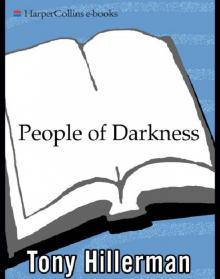 People of Darkness
People of Darkness Talking God jlajc-9
Talking God jlajc-9 Skinwalkers jlajc-7
Skinwalkers jlajc-7 The Ghostway jlajc-6
The Ghostway jlajc-6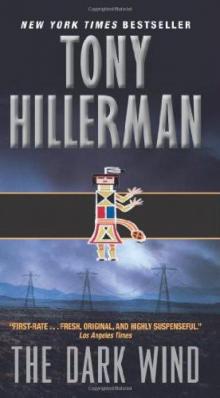 The Dark Wind jlajc-5
The Dark Wind jlajc-5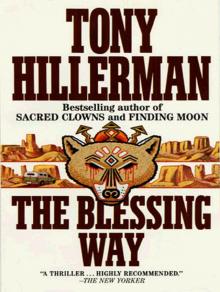 The Blessing Way
The Blessing Way Hunting Badger jlajc-14
Hunting Badger jlajc-14 Seldom Disappointed: A Memoir
Seldom Disappointed: A Memoir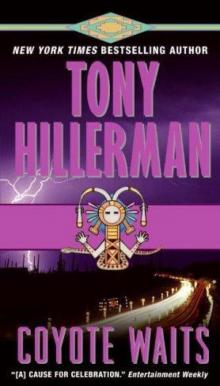 Coyote Waits jlajc-10
Coyote Waits jlajc-10 Skeleton Man jlajc-17
Skeleton Man jlajc-17 The Shape Shifter
The Shape Shifter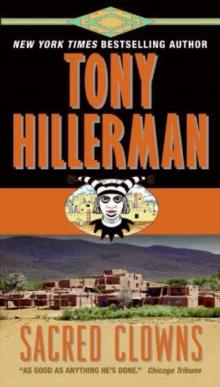 Sacred Clowns jlajc-11
Sacred Clowns jlajc-11 The Fallen Man jlajc-12
The Fallen Man jlajc-12 The First Eagle jlajc-13
The First Eagle jlajc-13 Listening Woman jlajc-3
Listening Woman jlajc-3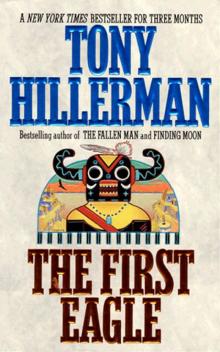 The First Eagle
The First Eagle Skeleton Man
Skeleton Man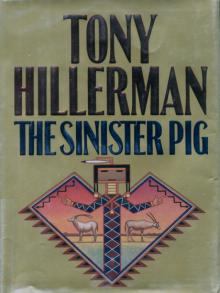 The Sinister Pig jlajc-16
The Sinister Pig jlajc-16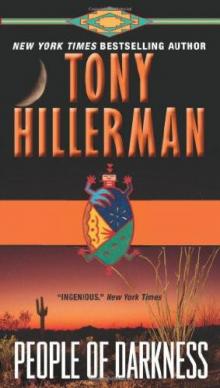 People of Darkness jlajc-4
People of Darkness jlajc-4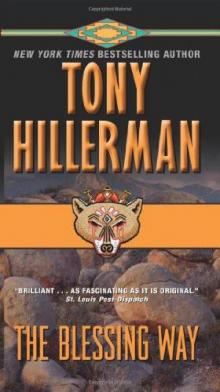 The Blessing Way jlajc-1
The Blessing Way jlajc-1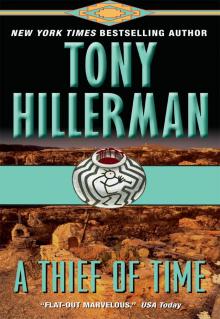 A Thief of Time
A Thief of Time The Wailing Wind
The Wailing Wind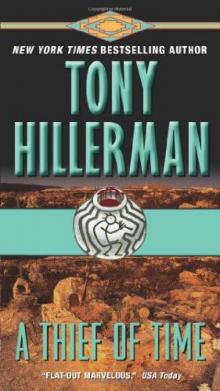 A Thief of Time jlajc-8
A Thief of Time jlajc-8 The Wailing Wind jlajc-15
The Wailing Wind jlajc-15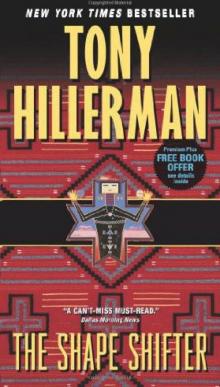 The Shape Shifter jlajc-18
The Shape Shifter jlajc-18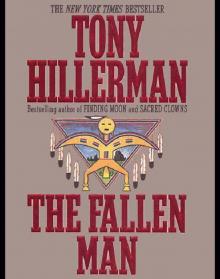 The Fallen Man
The Fallen Man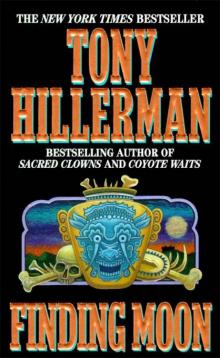 Finding Moon
Finding Moon